The euro slumps against most of its G-10 currency counterparts as the French President called a snap election, and the far right gained seats in the European Parliament
The euro, serving as the official currency for 20 members of the European Union, has seen a sharp decline since Friday as uncertainties arise following Macron calling a snap election in response to a surge in support for the far-right Rassemblement National in France. Elsewhere in Europe the far-right parties gained support, although Ursula von der Leyen’s European People’s Party gained seats and remains the strongest party.
At 12:48 am Central European Time, the euro tumbled 1% against the US dollar since the market opened on Friday, reaching 1.0774, a nearly one-month low. Meanwhile, the single currency weakened against the British pound to 0.8469, the lowest level since August 2022. The euro also fell against the Swiss franc to 0.9660, a more than two-month low.
Far-right parties gain overwhelming power in major EU economies
Far-right power surges in major member countries in the European Union, according to the latest polls. In France, Emmanuel Macron was dissolving the National Assembly and calling a snap election in a huge defeat by the far-right National Rally of Marine Le Pen, who won 31.5% percent of the vote, more than double that of Macron’s Renaissance party.
In Italy, Prime Minister Giorgia Meloni’s Brothers of Italy solidified her power in the European Union with an estimated 28% of the votes, the highest in the country. Additionally, Germany’s far-right party, Alternative for Germany (AfD), took second place with a 16.2% vote, according to the state broadcaster ARD, while Chancellor Olaf Scholz’s Social Democrats scored their worst result ever. Moreover, Austria’s far-right Freedom Party took the lead with a 27% vote, far ahead of the ruling party of 23.5%. Far-right powers also saw surges in Belgium and Spain. The far-right leader, Viktor Orban, remained in first place in Hungry, despite achieving the worst result ever.
The potential gains in far-right power come at the expense of significant losses for the Green and liberal Renew parties, with each projected to lose around 20 MEPs according to the latest polls. This shift could exert a strong influence on key EU policies, including the Green Deal, pro-European Union stances, immigration law, and aid for the war in Ukraine.
Why does it matter to the euro?
The immediate decline in the euro reflects mounting uncertainties amid the surging power of far-right parties. These right-wing representatives, largely populists, tend to be EU skeptics, anti-immigration, anti-green transition, or pro-Russia. Their increasing influence within these groups has the potential to disrupt the European Union’s parliamentary policies in these areas, leading to challenges in political and economic alignments.
The shifting of power may weaken their respective governmental enforcement of key policies, which is seen as a threat to national and EU-level security. Political uncertainties may disrupt orderly economic activities, hence, weakening economic growth. Simply put, the euro declined amid the potential weakening functionality of the national governments.
The movements of major government bond yields in the Eurozone will be closely watched at the market open on Monday. A weakened euro may signal declines in these sovereign bond yields as investors may seek haven assets. French and German benchmarks are particularly in the spotlight, where stocks and bond yields may be set to decline, which could cause widening spreads with government bond yields in countries such as Italy and Spain.
Other factors driving a weak euro
The European Central Bank delivered the first rate cut since 2019 last week, marking the end of the current rate hike cycle. Despite a hawkish stance at the policy meeting, rising political uncertainties may pressure the ECB to be more accommodative in the monetary policy in supporting the region’s economy. This could further divert the policy stance of the central bank from that of its Western peers, especially the Federal Reserve (Fed). The Fed is poised to decide on its interest rate on Thursday, with no expectations for a policy shift.
The euro zone’s economy stagnated in the second half of 2023, and the continuing political landscape may further cloud the outlook. In contrast to the euro area, the United States economy is much stronger and more stable, which may incentivise investors to sell the euro and buy the US dollar as a safe haven.

